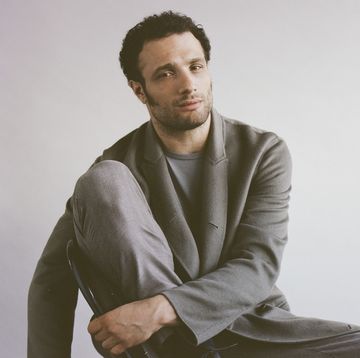Nearly two decades ago, The Wire and The Sopranos redefined the craft of TV storytelling. While these shows set a new bar for writing, acting, and directing, they tapped into the greater cultural and political conversations of the turn of the century: For The Sopranos, when late '90s TV was clinical, and for The Wire, in a broken post-9/11 America.
Tonight marks the debut of The Night Of (though the first episode has been available for streaming on HBO Now and HBO Go). It's created by The Wire's Richard Price and brings actors that you'll remember from that iconic series along with Boardwalk Empire and The Sopranos (the lead role was written for James Gandolfini, who is given a posthumous executive producer credit). Without giving anything away, the 90-minute premiere follows the son of a Pakistani cab driver, who goes into the city for a party and ends up in jail for the stabbing of a 22-year-old woman. At its heart, The Night Of isn't reinventing the HBO crime drama, but it's reshuffling it—and at the perfect time.
This show arrives at the conclusion of a tragic week—one defined by bloodshed, divisive language, and the ever-present arguments concerning racism, criminal justice, and violence in this country. There's no Veep, there's no Silicon Valley, there's no Game of Thrones to watch this Sunday to escape from the horrors we saw this week.
Instead we have The Night Of, the first of an eight-episode mini-series that depicts, with biting realism, the broken, morally ambiguous, and systematically racist way our criminal justice system works. And it's all viewed through the lens of a national obsession with true crime (and true crime-ish drama) like Making a Murderer, Serial, The People v. O.J. Simpson, and The Jinx.
Like those meticulously researched timelines of the murder of Hae Min Lee in Serial or the murder of Teresa Halbach in Making a Murderer, we're watching the hours before the murder play out like a crime drama, like a thriller or horror—take your pick. And all the while, you'll see the evidence placed throughout the episode like a crime scene of its own: a knife here, a security camera there, a drop of blood, a fingerprint, a witness. It's all tough to watch, thanks in large part to the objectivity of the storytelling. The passing racism of a stranger or an authority figure, the procedural failures, and bad decisions of even the most moral characters are as tough to stomach as the bloody crime scene.
They're all details we'll be talking about tomorrow, for the next eight weeks, and, potentially, for years to come.













